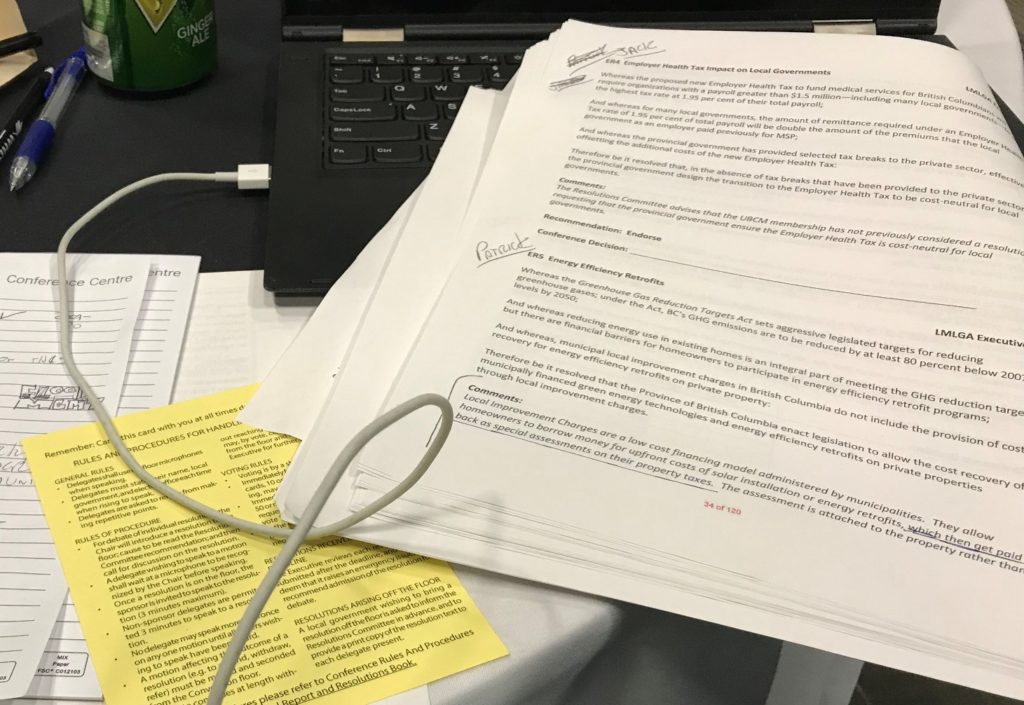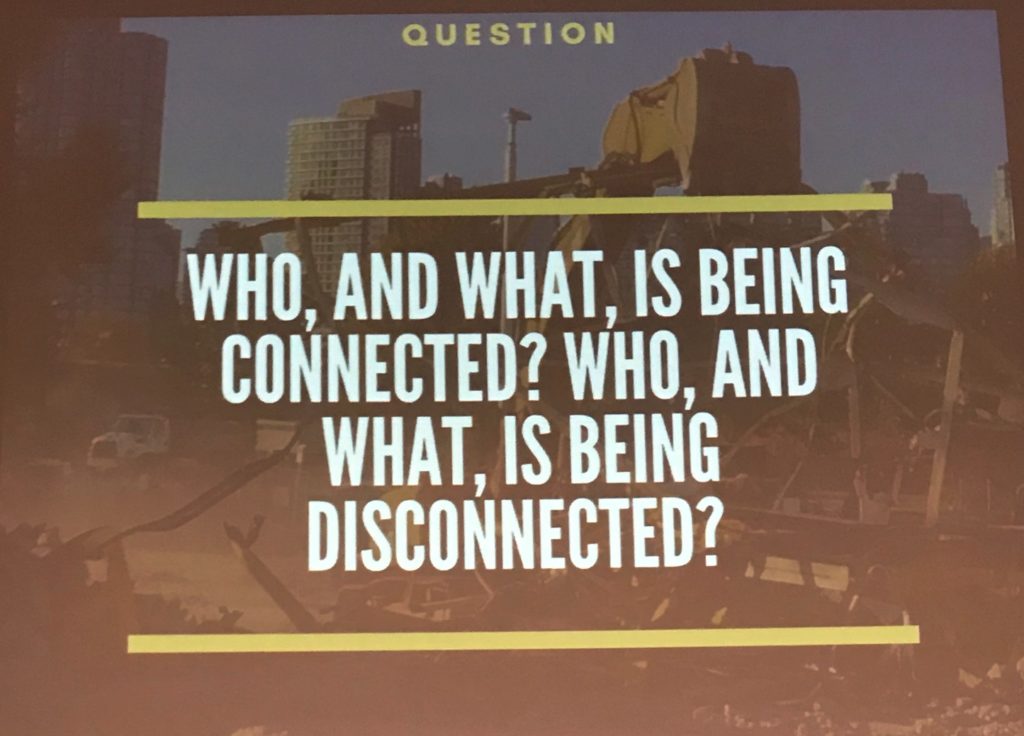As a follow-up to this post, here is the second half of the LMLGA Conference in May. This may not be as interesting for my regular readers (Hi Mom!) as me ranting about traffic, but I think it is important that I report out to the community what I learned during the conference, because the community paid for me to attend the conference. As I am on the LMLGA Board, the cost for one of my nights was covered by the LMLGA, but the City still paid my registration for the conference, and paid part of the travel cost (I car-pooled with other attendies).
As I mentioned last post, a big part of the annual conference is the Resolutions session. This is when the members of the LMLGA vote on resolutions to be forwarded to senior governments, asking them to change policy or prioritize spending to meet the needs of our communities. The 2018 session included more than 40 resolutions, with about half of them at least slightly debated. This was an unusual year in that three separate resolutions or proposed amendments were defeated in tie votes (which is pretty unique with ~100 voting members present). If you want to know the results of all of the votes, you can read them here.
In brief, the two resolutions put forward by New Westminster were endorsed. The first was to ask the provincial government to prioritize the funding and support of the Community Health Centre model for providing general health care in communities across BC. The second was to ask the provincial government to update the BC Motor Vehicle Act by addressing the recommendations of the Road Safety Law Reform Group of BC to better protect vulnerable road users ( as I talked about in this report earlier in the year). Both were endorsed by the LMLGA Executive, and passed by the membership without debate.
Day 2 Featured a session on Digital Connectivity that started with a presentation from a technology director at Amazon, talking about what they see as the future of retail. Depending on your outlook on the world (or possibly your age), he either described a stunning future where your computer will know exactly what hammer you need before you even go on line to shop for it, and one click later the hammer arrives at your door within two hours, or a stark dystopia where every decision you make is predetermined by algorithms and every human interaction or social aspect of purchasing goods is scrubbed away as “friction” that interferes with the efficiency of the market. So that was interesting.

This was followed by another ying/yang tech discussion by Mayor Greg Moore, directed at the elected officials in the room. He talked about the positive opportunities that Social Media provides to engage with your electorate, both during campaigns and while you are in office. He then described, step by step, how a single person with a bone to pick, a couple of hours to kill, and $20 can use a social media platform like Facebook to create a powerfully disruptive disinformation campaign using the same tools, and make themselves look like a large crowd of people to amplify their voice. It was stunningly familiar, and a valuable lesson to all of us who seek to engage meaningfully in decision making. If you don’t know who you are talking to on-line, it is quite possible they do not actually exist.
This led us into a closing plenary session on Human Connectivity, which brought together several aspects of making human connections in a time of digital disconnection. We had presentations about the power of volunteering, about working for sustainability within a community framework, and about thinking deeper about the everyday interactions we have, and what underlying the narratives we often miss may be telling us about ourselves and our community. It was inspirational, but also challenging – we are so busy “doing” or “planning”, that we are sometimes forgetting to take the time to listen, look, and understand the interactions in front of us.
I’ve given a bit of a summary of my learnings/rememberings from LMLGA, but there was more. The Minister for Local Government and Housing gave us a great update on where housing policy is going in the province, the Leader of the Official Opposition told us all of the things that the current government has not accomplished in 9 months, seemingly forgetting his government had 16 years to do the same things. Of course the networking, both formal and informal, with local government leaders across the region are valuable, and the LMLGA executive met to discuss next steps, including developing a better plan to present the resolutions to government members in Victoria. Altogether an informative, inspiring, and crazy busy 2-1/2 days.
Hey Patrick, thanks for the post. I am wondering though, what about the fb page you linked to qualifies as disinformation? I did a quick scroll through recently and although the moderator is unclear, it seems to be backed up by facts and a variety of users who support the anti-tower movement. The way the talk you refer to is represented here it sounds like politicians are happy to use social media as a platform, but feel threatened by the electorate reciprocating that exercise.
Thanks, Brian, that is actually a good question, and I am reluctant to call more attention to that particular site by digging too deep into it. But I’ll tell you some warning signs to look for in general when a Facebook activist group pops up.
Is the site anonymous, or is it clear who is doing the writing? Is all the writing similar in tone and use of language, but the author infers they are a group? Does the author blame a number of somewhat related or non-related problems on one scare-word, without really defining what that word means to them? Does the author ignore or obfuscate any challenging questions? Does the author immediately block anyone offering counter-ideas or even evidence suggesting one or more of their assertions are misplaced? Is the site being promoted to you (in other words, they are paying for the page to appear in your feed), but you don’t know who the persons paying the bill are?
In contrast, when I use social media, do it honesty and stand behind my own name. I try my best to answer people’s questions, and provide links to primary sources when facts are needed. I have never (that I recall) blocked or barred anyone from my feeds. I know groups in New West who act in a similar way in their on-line presence, and love to engage with them. It’s not about who is behind the media channel, or whether I agree with them, it is about the honesty in the conversation.